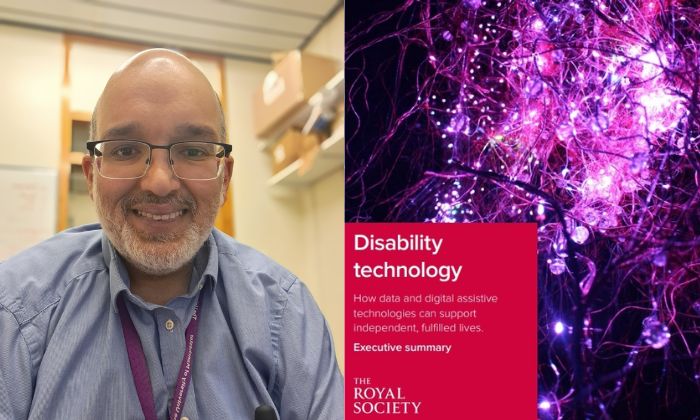Putting disabled voices at the heart of assistive technologies
25 Jul 2025
Dr Hamied Haroon, Research Fellow at UoM, shapes Royal Society report

Dr Hamied Haroon, a Research Fellow at the University of Manchester and prominent advocate for disability inclusion in science, played a key role in shaping a new Disability Technology report released by the Royal Society, the UK’s national academy of sciences. The groundbreaking new report calls for a radical shift in how digital assistive technologies are designed, urging that disabled people must be central to the process if tech is to truly transform lives.
As a member of the Royal Society Diversity and Inclusion Committee’s Disabled Scientists Subgroup, Dr Haroon brought both scientific expertise and lived experience to the project:
“We shouldn’t be developing assistive technologies or policies without disabled people. How do you capture the day-to-day challenges they face, or ensure you’re offering solutions that actually work, unless you talk to disabled people?”
The report highlights the critical role digital assistive technologies (or digital AT)—such as screen readers, speech recognition, and smartphone navigation apps—play in enabling 1.3 billion disabled people worldwide to live independent, fulfilling lives. But it warns that systemic barriers still block access for too many.
More than half of disabled users surveyed said they couldn’t live the way they do without such tools, yet high costs, poor infrastructure, and limited training keep many locked out.
Dr Haroon stresses that this isn’t just about better technology—it’s about equity:
“These assistive technologies are fundamental to the workplace and our daily tasks – but they can be prohibitively expensive or unusable in some settings. We need to remove those barriers—whether that’s financial, technical, or societal.”
The report recommends:
· Recognising smartphones as assistive technologies, alongside wheelchairs and hearing aids.
· Improving training, funding, and support to make digital AT more accessible.
· Expanding infrastructure like mobile data networks in rural and low-income areas.
· Collecting more meaningful data on everyday functional challenges, rather than relying solely on self-identified disability.
Watch the video now for a fantastic summary.
